中考英语语法专题详解七
初三英语中考语法考点重难点详解(七)状语从句的时态知识点整理总结(含主将从现)
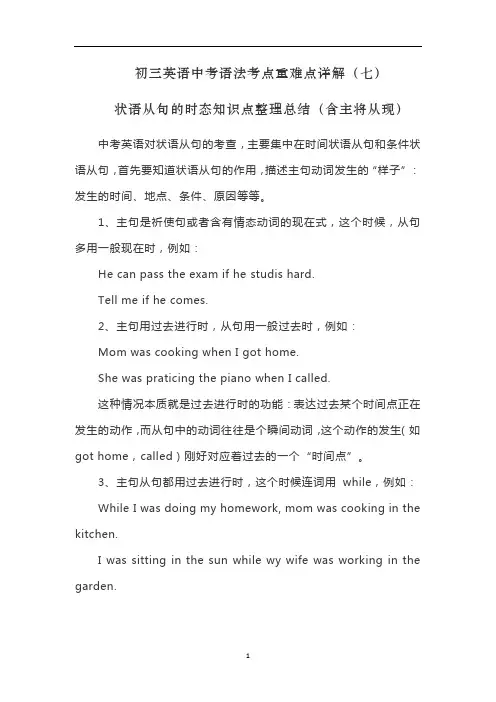
初三英语中考语法考点重难点详解(七)状语从句的时态知识点整理总结(含主将从现)中考英语对状语从句的考查,主要集中在时间状语从句和条件状语从句,首先要知道状语从句的作用,描述主句动词发生的“样子”:发生的时间、地点、条件、原因等等。
1、主句是祈使句或者含有情态动词的现在式,这个时候,从句多用一般现在时,例如:He can pass the exam if he studis hard.Tell me if he comes.2、主句用过去进行时,从句用一般过去时,例如:Mom was cooking when I got home.She was praticing the piano when I called.这种情况本质就是过去进行时的功能:表达过去某个时间点正在发生的动作,而从句中的动词往往是个瞬间动词,这个动作的发生(如got home,called)刚好对应着过去的一个“时间点”。
3、主句从句都用过去进行时,这个时候连词用while,例如:While I was doing my homework, mom was cooking in the kitchen.I was sitting in the sun while wy wife was working in the garden.这种情况其实是考试连词while的含义:在……的过程中,这样从句的动词就需要一个“延续性”动词,才能和while 配合完美。
4、关于条件句的用法,是出题人最喜欢采用的If he comes, give him the picture.(主句是祈使句,天剑局是一般现在时)If we try our best, we'll get good grades.主将从现是一般原则,但是要注意也有很多不是主将从现的主从句配合。
补充知识点:“主将从现”首先我们知道一个句子的成分包含,“主谓宾定状补”,那么在句中作状语的从句称为状语从句。
九年级英语第七单元讲解
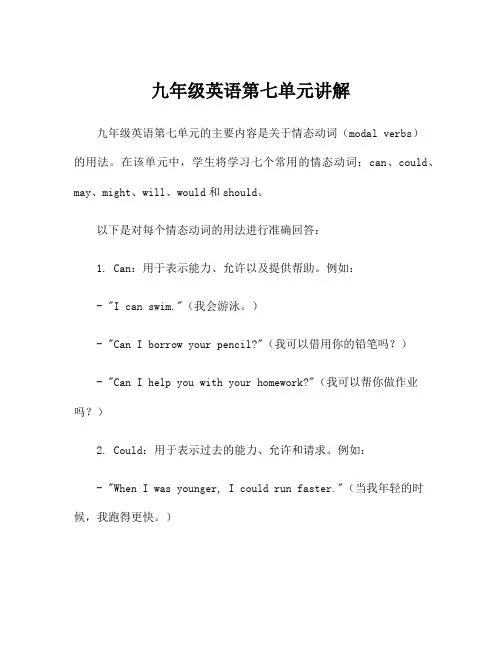
九年级英语第七单元讲解九年级英语第七单元的主要内容是关于情态动词(modal verbs)的用法。
在该单元中,学生将学习七个常用的情态动词:can、could、may、might、will、would和should。
以下是对每个情态动词的用法进行准确回答:1. Can:用于表示能力、允许以及提供帮助。
例如:- "I can swim."(我会游泳。
)- "Can I borrow your pencil?"(我可以借用你的铅笔吗?)- "Can I help you with your homework?"(我可以帮你做作业吗?)2. Could:用于表示过去的能力、允许和请求。
例如:- "When I was younger, I could run faster."(当我年轻的时候,我跑得更快。
)- "Could I please have some water?"(我可以请你给我一点水吗?)- "Could you help me carry these books?"(你可以帮我拿这些书吗?)3. May:用于表示请求、许可以及可能性。
例如:- "May I have another piece of cake?"(我可以再要一块蛋糕吗?)- "May I go to the bathroom?"(我可以去洗手间吗?)- "It may rain later, so bring an umbrella."(可能会下雨,所以带把伞。
)4. Might:用于表示可能性以及猜测。
例如:- "I might go to the party tonight."(我可能今晚去参加聚会。
)- "He might be late for the meeting."(他可能会迟到会议。
人教版英语九年级全册Unit7(语法透视):含情态动词的被动语态
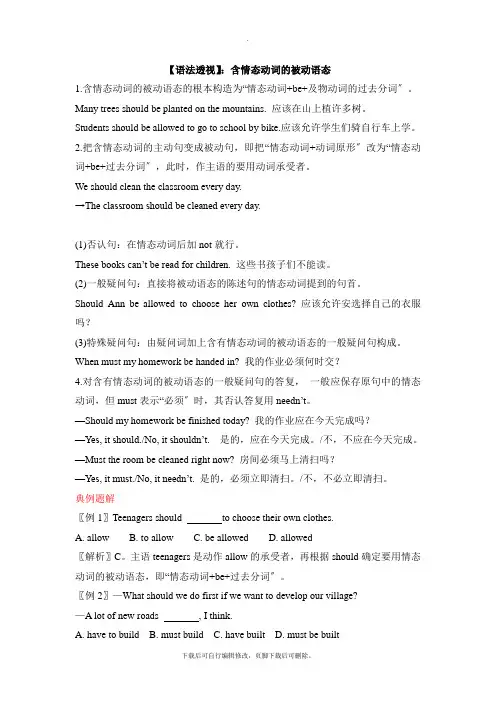
【语法透视】:含情态动词的被动语态1.含情态动词的被动语态的根本构造为“情态动词+be+及物动词的过去分词〞。
Many trees should be planted on the mountains. 应该在山上植许多树。
Students should be allowed to go to school by bike.应该允许学生们骑自行车上学。
2.把含情态动词的主动句变成被动句,即把“情态动词+动词原形〞改为“情态动词+be+过去分词〞,此时,作主语的要用动词承受者。
We should clean the classroom every day.→The classroom should be cleaned every day.(1)否认句:在情态动词后加not就行。
These books can’t be read for children. 这些书孩子们不能读。
(2)一般疑问句:直接将被动语态的陈述句的情态动词提到的句首。
Should Ann be allowed to choose her own clothes? 应该允许安选择自己的衣服吗?(3)特殊疑问句:由疑问词加上含有情态动词的被动语态的一般疑问句构成。
When must my homework be handed in? 我的作业必须何时交?4.对含有情态动词的被动语态的一般疑问句的答复,一般应保存原句中的情态动词,但must表示“必须〞时,其否认答复用needn’t。
—Should my homework be finished today? 我的作业应在今天完成吗?—Yes, it should./No, it shouldn’t. 是的,应在今天完成。
/不,不应在今天完成。
—Must the room be cleaned right now? 房间必须马上清扫吗?—Yes, it must./No, it needn’t. 是的,必须立即清扫。
【冀教版】九年级英语Unit7同步讲解语法讲解下
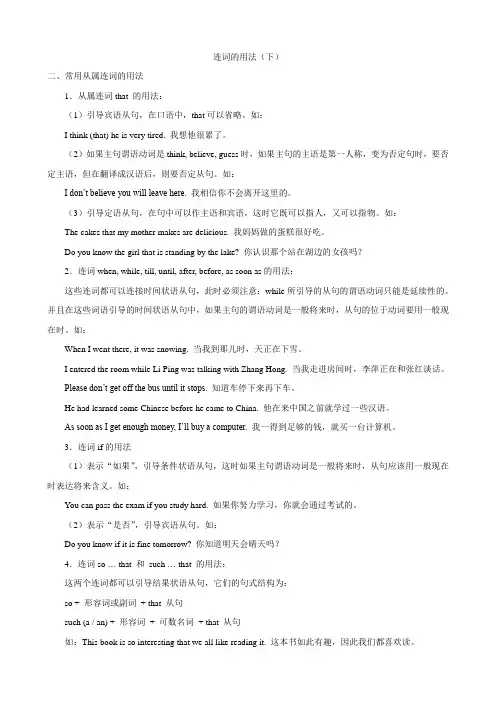
连词的用法(下)二、常用从属连词的用法1.从属连词that 的用法:(1)引导宾语从句,在口语中,that可以省略。
如:I think (that) he is very tired. 我想他很累了。
(2)如果主句谓语动词是think, believe, guess时,如果主句的主语是第一人称,变为否定句时,要否定主语,但在翻译成汉语后,则要否定从句。
如:I don’t believe you will leave here.我相信你不会离开这里的。
(3)引导定语从句,在句中可以作主语和宾语,这时它既可以指人,又可以指物。
如:The cakes that my mother makes are delicious. 我妈妈做的蛋糕很好吃。
Do you know the girl that is standing by the lake? 你认识那个站在湖边的女孩吗?2.连词when, while, till, until, after, before, as soon as的用法:这些连词都可以连接时间状语从句,此时必须注意:while所引导的从句的谓语动词只能是延续性的。
并且在这些词语引导的时间状语从句中,如果主句的谓语动词是一般将来时,从句的位于动词要用一般现在时。
如:When I went there, it was snowing. 当我到那儿时,天正在下雪。
I entered the room while Li Ping was talking with Zhang Hong. 当我走进房间时,李萍正在和张红谈话。
Please don’t get off the bus until it stops.知道车停下来再下车。
He had learned some Chinese before he came to China. 他在来中国之前就学过一些汉语。
As soon as I get enough money, I’ll buy a computer.我一得到足够的钱,就买一台计算机。
【配套K12】人教版初中初三九年级英语第七单元unit7课文重难点知识点详细讲
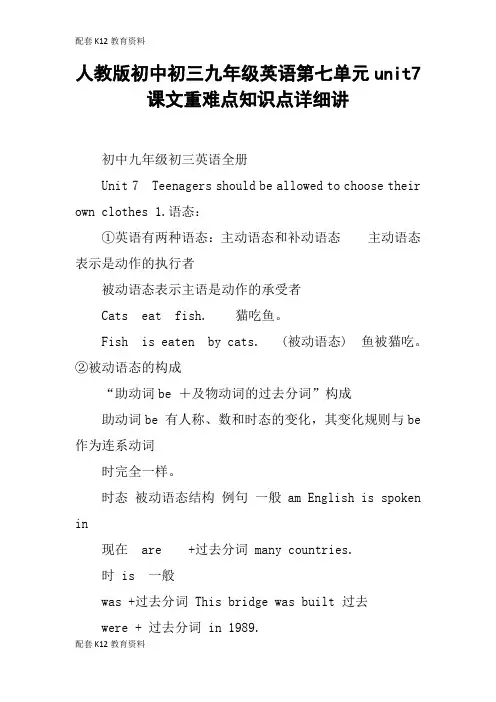
人教版初中初三九年级英语第七单元unit7课文重难点知识点详细讲初中九年级初三英语全册Unit 7 Teenagers should be allowed to choose their own clothes 1.语态:①英语有两种语态:主动语态和补动语态主动语态表示是动作的执行者被动语态表示主语是动作的承受者Cats eat fish. 猫吃鱼。
Fish is eaten by cats. (被动语态) 鱼被猫吃。
②被动语态的构成“助动词be +及物动词的过去分词”构成助动词be 有人称、数和时态的变化,其变化规则与be 作为连系动词时完全一样。
时态被动语态结构例句一般am English is spoken in现在 are +过去分词 many countries.时 is 一般was +过去分词 This bridge was built 过去were + 过去分词 in 1989.时can/should 情态 may +be+The work must be 动词过去分词 done right now. must/…③被动语态的用法当我们不知道谁是动作的执行者,或者没有必要指出谁是动作的执行者,或者只需强调动作的承受者时,要用被动语态。
2. allow sb. to do sth. 允许某人做某事如:Mother allows me to watch TV every night. 妈妈允许我每晚看电视。
be allowed to do sth. 被允许做某事如: Lily is allowed to go to Qinzhou. 莉莉被允许去钦州。
3. get their ears pierced 穿耳洞让/使做某事 get sth. done (过去分词) have sth. done (过去分词)如:I get my car mended. = I have my car mended. 我让别人修好我的车初中九年级初三英语全册初中九年级初三英语全册4. enough 足够形容词+enough 如:beautiful enough 足够漂亮enough+名词如:enough food 足够食物enough to 足够…去做…如:I have enough money to go to Beijing. 我有足够的钱去北京。
人教版九年级英语 Unit 7 单元语法小专题
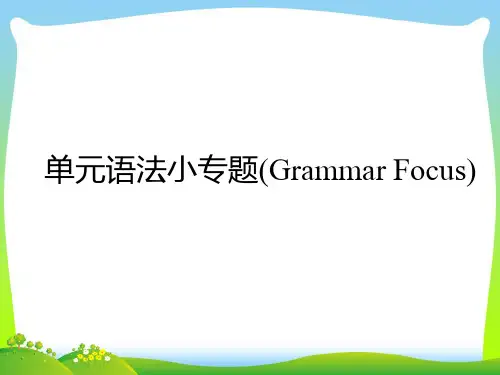
如: —Should these young trees be watered every day?应该每天给 这些小树浇水吗? —Yes,they should./ No,they shouldn‘t.对,应该。/不,不 应该。 (4)特殊疑问句结构为:疑问词+一般疑问句?如: What should students be allowed to do?应该允许学生们做什 么?
Ⅲ.根据汉语意思完成句子,每空一词。
16.更远的恒星有一天可能被参观。 Farther planets _m__a_y____ __b_e_____ __v_i_si_te_d__ one day.
17.你不应该在动物园里喂动物。 Animals __sh_o_u_l_d_n_'t____b_e___ __fe_d_____ by you in the zoo.
13、He who seize the right moment, is the right man.谁把握机遇,谁就心想事成。2021/7/212021/7/212021/7/212021/7/217/21/2021
• 14、谁要是自己还没有发展培养和教育好,他就不能发展培养和教育别人。2021年7月21日星期三2021/7/212021/7/212021/7/21
•
9、要学生做的事,教职员躬亲共做; 要学生 学的知 识,教 职员躬 亲共学 ;要学 生守的 规则, 教职员 躬亲共 守。2021/7/212021/7/21Wednesday, July 21, 2021
• 10、阅读一切好书如同和过去最杰出的人谈话。2021/7/212021/7/212021/7/217/21/2021 12:09:45 AM
(2)否定句结构为:主语+情态动词+not+be+及物动词的过 去分词+(by+宾语)Байду номын сангаас如:
九年级英语unit7知识点精讲:语法考点
九年级英语unit7知识点精讲:语法考点
【单元语法】本单元语法:过去完成时。
过去完成时表示在过去某一时间点以前即“过去的过去”已经发生的动作。
Mr. Black told me that he had seen the movie three times.
过去完成时要注意以下几个方面:
⑴ 过去完成时表示在过去某一时间或动作之前已经发生或完成的动作。
它表示动作发生的时间是“过去的过去”。
⑵ 过去完成时的结构是:
肯定由“助动词had(用于各种人称和数) + 过去分词”构成
否定式:had not + 过去分词缩写形式:hadn’t
⑶ 过去完成时的时间状语:
① 表示过去某一时间可用by, before等构成的短语。
We had finished our homework before 10 o’clock.
② 可能通过when, before等引导的从句表示。
When I got there, the train had left.
③ 过去某一时间通过上下文来表示。
Kate hadn’t studied hard, so she didn’t pass the exam yesterday.
1/ 1。
2020年中考英语七大语法解析
【导语】当你真正想完成⼀件事时,根本不会在意别⼈是否看到。
备考漫漫长路,和你⼀起默默地⾛下去。
以下是2020年中考英语七⼤语法解析,⼀起来看看吧! ⼀、介词by的⽤法 1、意为“在……旁”,“靠近”。
Some are singing and dancing under a big tree。
Some are drawing by the lake。
有的在⼤树下唱歌跳舞。
有的在湖边画画⼉。
2、意为“不迟于”,“到……时为⽌”。
Your son will be all right by supper time。
你的⼉⼦在晚饭前会好的。
How many English songs had you learned by the end of last term? 到上个学期末你们已经学了多少⾸英语歌曲? 3、表⽰⽅法、⼿段,可译作“靠”、“⽤”、“凭借”、“通过”、“乘坐”等。
The monkey was hanging from the tree by his tail and laughing。
猴⼦⽤尾巴吊在树上哈哈⼤笑。
The boy’s father was so thankful that he taught Edison how to send messages by railway telegraph。
孩⼦的⽗亲是那么的感激,于是他教爱迪⽣怎样通过铁路电报来传达信息。
4、表⽰“逐个”,“逐批”的意思。
One by one they went past the table in the dark。
他们⼀个⼀个的在⿊暗中经过这张桌⼦。
5、表⽰“根据”,“按照”的意思。
What time is it by your watch? 你的表⼏点了? 6、和take , hold等动词连⽤,说明接触⾝体的某⼀部分。
I took him by the hand。
我拉住了他的⼿。
人教版九年级全一册英语 Unit 7 重点语法知识点复习提纲
人教版九年级全一册英语Unit 7 重点语法知识点复习提纲Unit 7 Teenagers should be allowed to choose their own clothes.一、【精选单词】:part-time job, chance, community,license, safety, society,cry, educate, enter, hug, lift ,manage, regret, smoke, support,get in the way of, keep away from,talk/shout back, make one’s own,decision二、【词组归纳】:1.be allowed to do 被允许做2.choose their own clothes选择他们自己的衣服3.get his driver’s license 拿到他的驾照4.be worried about your safety 担心你的安全5.have part-time jobs 找兼职6.get their ears pierced 穿耳孔7.be serious enough 足够认真8.strop doing/to do 停止正在做/去做9.wear that silly earring 带那个可笑的耳环10.seem to have many friends 似乎有些朋友11.need to do 需要做12.spend time with friends 和朋友一起度过时光13.be excited about doing 兴奋地做…e a flash 用闪光灯15.protect paintings 保护绘画16.a tiny baby 非常小的孩子17.cry all night 哭一晚上18.sing to me 给我唱歌19.stay by my side 呆在我身边20.run through the field 跑过田地21.make sure 确信,确保22.keep me from danger 让我远离危险23.fall and hurt myself.摔倒伤了自己24. give me a hug 拥抱我25.lift me up 扶起我26.cough badly 咳嗽的厉害27.talk back 顶嘴28.watch scary movies 看恐怖片29.awful dreams 恶梦30.shout back angrily 生气地大声回应31.an adult 成人32.think back to those times 回忆那些时光33.be late for school 上学晚34.regret doing/to do 后悔做过/没做..35.the whole poem 整首诗36.encourage sb. to do 鼓励某人做37.do social work for their community 为社区做社会工作38.keep teenagers away from 使青少年避免接近39.give sb chances to do 给某人做什么的机会40. make their own decisions 做出他们自己的决定41. move out 搬出去42. take care of 照看43.from a young age 从小44.manage their lives 谋生45.in the most Asian societies 在大部分亚洲社会46.get to class late上课晚47.finish a test early早交卷48.worry about doing 担心做49.take the test(later)参加(补)考试50.fail /pass a test考试不及格/及格51.get in the way of妨碍52.practice their hobbies练特长53.as much as they want他们尽可能想多要的54.grow up长大55.support every one of his races支持他的每一次比赛56.have nothing agaist doing不反对做57.end up as a professional runner最终成为职业跑步者58.decide for oneself=make one’s own decision为自己做决定59.enter university上大学60.be serious about对……认真(严肃)61.be strict with sb.对某人严格62.be strict in sth.对某事严格63.spend more time on sth.在……多花时间64.care about关心,在意65.make this choice myself自己做选择66.Only then(开头后加倒装)只有那样67.have a chance to do有机会做某事68.achieve one’s dream实现某人的梦想69.keef off关闭70.teenagers under eighteen未成年人三、【必背句式A】1.---I don’t think sixteen-year-olds should be allowed to drive. ---I agree. They aren’t serious enough.2.---Do you think teenagers should be encouraged to make their own decisions?--- No, I don’t agree with this. Teenagers are too young to make their own decisions.3.---Teenagers should not be allowed to have part-time jobs. ---I disagree. They can learn a lot from working.4.--- Do you think we may be allowed to take photos if we don’t use a flash?--- If you don’t use a flash, then it may be OK.四、【必背句子B】1.Teenagers should be encouraged to do social work for their community. 青少年应该被鼓励为他们的社区做社会工作。
九年级unit7知识点梳理
九年级unit7知识点梳理Unit 7 知识点梳理Unit 7 主要介绍了九年级学生在英语学习中需要掌握的一些重要知识点。
在本单元中,包括了几个重要的语法点、词汇以及阅读和听力技巧。
下面将对这些知识点进行详细的梳理。
1. 过去完成时(Past Perfect)过去完成时用于表示在过去某个时间或事件之前已经完成的动作或状态。
它由had + 过去分词构成。
例如:- She had already finished her homework before her mom came home.2. 必须与既定的动作或事件同时发生的过去时态有些动词需要与既定的动作或事件同时使用过去时态。
例如:- I realized that I had forgotten my bag after I got on the bus.3. 含有宾语从句的宾语从句要使用过去完成时当宾语从句中的动作发生在主句中所描述的过去动作之前时,需要使用过去完成时。
例如:- She said that she had never been to Paris before.4. 反意疑问句(Tag Questions)反意疑问句用于对陈述句进行确认或否定。
通常使用肯定陈述句 + 否定疑问词构成。
例如:- You have read the book, haven't you?5. 带有否定词的特殊疑问句带有否定词的特殊疑问句常用于询问具体情况或原因,并使用"why" 或 "how" 开头。
例如:- Why didn't you attend the party?6. 非谓语动词的过去完成时过去完成时的非谓语动词结构为 "having + 过去分词" 。
例如:- Having finished his homework, he went to bed.7. 词汇在Unit 7中,我们还学习了一些与城市和环境相关的词汇。
- 1、下载文档前请自行甄别文档内容的完整性,平台不提供额外的编辑、内容补充、找答案等附加服务。
- 2、"仅部分预览"的文档,不可在线预览部分如存在完整性等问题,可反馈申请退款(可完整预览的文档不适用该条件!)。
- 3、如文档侵犯您的权益,请联系客服反馈,我们会尽快为您处理(人工客服工作时间:9:00-18:30)。
中考英语语法专题详解七专题七情态动词、系动词在英语中,表示主语动作或状态的词就叫做动词。
根据动词的意义及在句子中的作用,可将动词分为实义动词(v)、系动词(link-v)、情态动词(modal verb)和助动词(v. aux)四种类型。
下面我们就来看看情态动词和系动词的具体用法。
一、情态动词情态动词本身有一定的意义,但不能独立作谓语,要和动词原形一起构成谓语,表说话人的语气和态度。
它没有人称和数的变化。
常见的情态动词有:1. can表示能力,有“能”“会”的意思;表示可能性,多用在否定或疑问句中;表示请求和许可。
如:The parrot can speak three languages. 这只鹦鹉能讲三种语言。
Can I borrow the book from the library?我可以从图书棺借这本书吗?Shanghai can be very cold in March. 上海三月份可能会很冷。
拓展延伸can还有过去式could 可表“能,会”,又可以和be able to替换,而be able to有更多时态。
如:He could swim when he was four. =He was able to swim when he was four. 他四岁时就会游泳。
在一般疑问句中,can/could 常用来表示请求或征求对方意见,用could 比用can语气更加委婉和客气。
类似用法的还有Will /Would you (please)…等句型。
如:Could you tell me how I can get to the post office? 你能告诉我怎样到邮局吗? Would you please turn up the radio?请你把收音机开大点,好吗?2.may表示“许可”时,相当于can,其否定回答用can’t/mustn’t;表推测时,常用在肯定句中,表“可能”。
如:-May I borrow your ruler?我可以借用您的直尺吗?-No, you can't /mustn't. 不行。
She may be a teacher. 她可能是一名教师。
拓展延伸may可表示祝愿。
如:May you succeed! 祝你成功!3.must表示“必须;必要”,以“must”开头的一般疑问句其肯定回答用“must”,否定回答用“needn't”或“don't have to”。
must表推测时,常用在肯定句中,是“一定”的意思,其否定形式mustn ' t表“禁止”的意思。
如:-Must I leave now?现在我必须离开吗?-No,you needn't /you don't have to. 没有必要。
This book must be Lucy's . Look! Her name is on the book cover. 这本书是露西的。
看!封面上还有她的名字。
You mustn't draw on the wall. 你不准在墙上画画。
拓展延伸must表示说话人的主观看法,只有一般现在时;have to强调客观要求,有时态、人称和数的变化。
如:My mother is ill. I have to look after her now. 妈妈病了,我得去照看她。
4.need作情态动词时,常用在否定和疑问句中,表示“需要;要”的意思。
如:Need we finish the work now?现在我们需要完成这项工作吗?They needn ' t look after him. 他们不需要照顾他了。
拓展延伸need还可以用作行为动词,可以用于各种句型。
如:Does he need any help? 他需要帮助吗?The desk needs repairing. 这张桌子需要修理。
5.shall 用于第一人称,表示说话人征求对方意见,过去式为should;will 用手第二人称的疑问句中,表示说话人向对方提出请求和建议,过去式为would。
如:Shall I go shopping with you?'我可以同你去购物吗?I don't know what I should do next. 我不知道下一步该干什么。
Would you please come a little earlier?请你来早一点好吗?6.情态动词had better的用法(1)had better 后接动词原形,表劝告、建议,意为“最好”。
“You'd better…”含有强制命令的语气,对长辈不宜使用。
如:You'd better ask that policeman over there. 你最好问一下那边的那个警察。
(2)慎用had better! 注意以下四条:①had better表达的是说话者强硬性的建议,告诫别人(包括自己)如何做。
如:Granny, the hospital is not very near. We'd better catch a bus. 奶奶,医院不是很近。
我们最好坐公共汽车。
②had better不用于礼貌的请求或征询,它隐含一种警告或威胁。
如:You ' d better finish the work today and bring it tomorrow. 你最好今天就把作业完成,明天带来。
③had better意思接近should,但它除了表示语气强硬以外,还表示马上要去做的事情,比should更紧迫。
如:You’d better see a doctor at once. 你最好马上去看医生。
④had better不含比较的意思,该结构表示“It would be good to…”,而不是“It would be better to…”。
二、系动词系动词有实际意义,但不能单独做谓语,必须与表语一起构成句子的谓语,说明主语的性质、状态或身份等。
它分为完全系动词和不完全系动词。
1.完全系动词(be)可接名词、代词、形容词、副词、介词短语、非谓语动词短语、句子做表语。
如:I'm a student. 我是个学生。
(名词) He is fine. 他很好。
(形容词) It is me. 是我。
(代词) Are you there?你在那儿吗?(副词) She is at school. 她在学校读书。
(介词短语) He is to come soon. 他过会儿该来了。
(不定式) My job is teaching English. 我的工作是教英语。
(动词的ing形式) My idea is that we will start now. 我的想法是我们现在就开始。
(句子)2.不完全系动词(get,turn,feel,smell,look,sound,taste)一般只接形容词做表语。
如:When spring comes, it gets warmer and warmer.春天来了,天气变得越来越暖和了。
Food may go bad soon if it is not put into a fridge.食物如果不放进冰箱里就会很快变坏。
My brother became / turned a teacher after his graduation.我哥哥毕业后就当上了老师。
(注意become和turn的用法区别)实战演练(2×50) 计分:1. --Mary, ____ you speak Chinese? -- Yes, but only a little.A. willB. canC. could2. --Must I do the work now? -- No, you ____. You can do it later.A. can'tB. mustn'tC. needn’t3. -- I can't stop smoking, doctor. -- For your health, I'm afraid you ____.A. canB. needC. must4. -- Whose book is it? -- It ____ be Bob's sister's. She is only a baby.A. mustB. mustn'tC. can't5. -- Jill looks so painful, there ____ be something wrong with her.-- Oh, dear! We'd better take her to the hospital at once.A. canB. shouldC. must6. --Is Simon coming by train? -- He should, but he ____ not. He likes driving his car.A. mayB. needC. must7. -- May I try on the jeans? -- Yes, you ___.A. shouldB. canC. must8. -- Do you know any traffic rules?-- A little. When the traffic lights are red, we ____ stop and wait.A. mayB. canC. must9. I think schools ____ allow students at least one hour a day for sports.A. wouldB. shouldC. could10. -- Can I swim in the lake. Dad?-- No, you ____. Haven't you seen the notice “No Swimming”?A. may notB. mightn'tC. mustn't11. -- Are you going to Beijing by air?-- It's fast but a little expensive. So I am not sure. I __ take it.A. willB. mayC. must12. -- Could I borrow your dictionary? -- Of course you ____.A. canB. willC. should13. --Don't forget to come to my birthday party tomorrow. --No,____.A. I don'tB. I won'tC. I can't14. -- Will you please stay here for the party?-- Sorry, I ____. I'll have to go to an important meeting.A. mustn'tB. needn'tC. can't15. -- Must I tidy the room now?-- No, you ____. You can do it after breakfast.A. mustn’tB. needC. don't have to16. -- You must come back every month. -- Yes, I ____.A. willB. mustC. should17. -- Is this coat Jane's? -- It ____ be hers, but I'm not sure.A. willB. mayC. must18. -- ____ we go and fly kites today? -- That's a good idea.A. ShouldB. MustC. Shall19. --ls your brother playing computer games, Ted?-- He ___ do that because the computer doesn't work.A. may notB. can'tC. mustn't20. -- I don't mind telling you what I have known.-- You ___, and I am not asking you for it.A. needn'tB. mustn'tC. may not21. _____ you help me?A.WillB.ShallC.Must22. You ______watch TV if you’ve finished your homework.A. canB. mustC. need23. I have seen lights in that empty house. Do you think I _____report it to the police?A. shouldB. mayC. will24. -- Who is the girl standing over there?-- Well, if you ______know, her name is Mary.A. mayB. canC. must25. -- Excuse me, could you tell me where the supermarket is?-- It’s two blocks straight ahead. You _____miss it.A. mustn’tB. can’tC. shouldn’t26. -- Mom, there goes the bell.-- Oh, it _____ Annie. I invited her to come for dinner.A. can’t beB. must beC. may be27. I’ll let you see the patient in an hour if you _____wait here.A. willB. mustC. can28. Whoever can answer one of my questions ______get a prize.A. wouldB. shouldC. will29. Tom, you ______leave all your clothes on the floor like this.A. wouldn’tB. mustn’tC. needn’t30. It’s 7:50. You ____hurry, or you’ll be late.A. mightB. willC. had better31. In spring, all the flowers in the garden _______ sweet.A. tasteB. smellC. become32. She _______ like her mother in character.A. isB. seemsC. looks33. In late autumn leaves _______ brown.A. getB. turnC. come34. Look! There _______ so many people here on vacation.A. haveB. areC. be35. His classmate_______ a singer.A. wereB. grewC. has become36. My job is ______ you math.A. to teachB. teachesC. taught37. How time flies! Three years _______ really a short time.A. areB. isC. was38. It sounds _______ a good idea.A. asB. isC. like39. Her temperature _______ to be all right.A. seemsB. soundsC. looks40. His wish to become a driver has _______ true.A. turnedB. comeC. been41. Little Jim’s speech sounds _______.A. friendlyB. wonderfullyC. nicely42. When her mother came home yesterday, it was _______ dark.A. goingB. runningC. getting43. These apples taste _______.A. to be goodB. goodC. well44. -- How about the cloth you bought yesterday?-- That’s very beautiful. It _______ so soft.A. feltB. feelsC. is feeling45. When his brother telephoned him last night, he _______ asleep.A. feltB. fellC. fall46. The food will _______ bad easily in such hot weather.A. goB. wentC. turn47. It _______ that he was late for the train.A. looksB. saysC.seems48. What does your brother look _______?A. likeB. asC. after49. The girl’s voice is so sweet and her songs _______ very beautiful.A. tasteB. lookC. sound50. What a lovely day! I hope it _______ fine.A. stayedB. will stayC. will get参考答案1-5BCCCC 6-10ABCBC 11-15BABCC 16-20ABCBA 21-25AAACB26-30BACBC 31-35BABBC 36-40ABCAB 41-45ACBBB 46-50ACACB。
